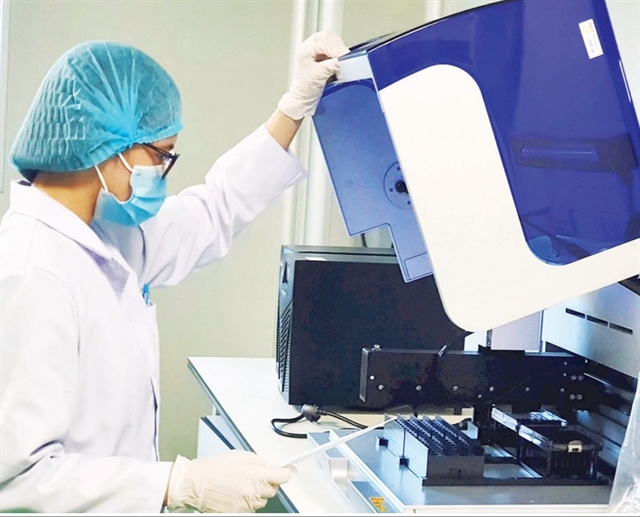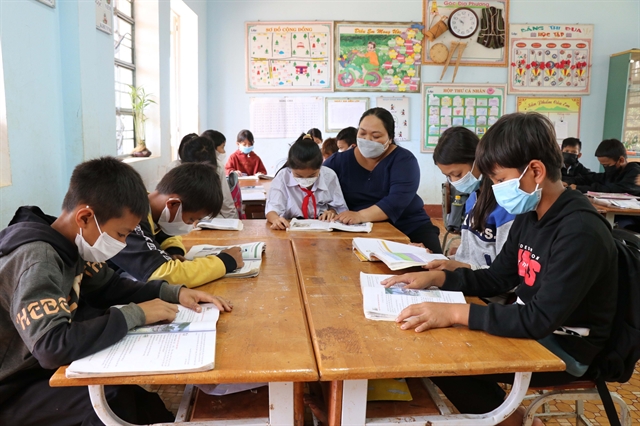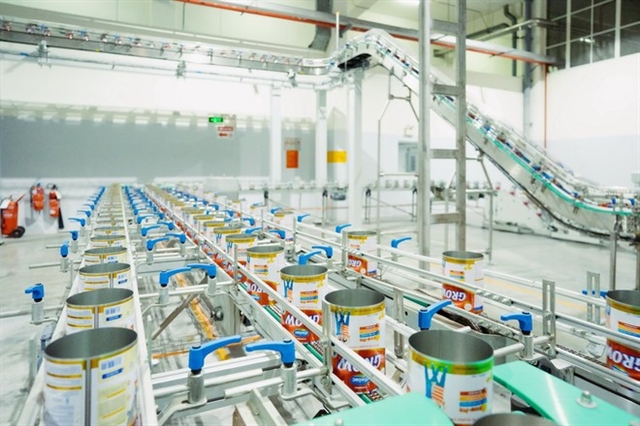 Society
Society

 |
| Students in a class in Ia Ka District in Central Highlands province of Gia Lai. VNA/VNS Photo Hồng Điệp |
GIA LAI — Computers and digital devices were crucial to students' learning at the peak of COVID-19. However, billions of đồng set aside to provide disadvantaged students with accessing online education services remains only on paper - even when they had already returned to in-person classes.
In the latter half of 2021, with the complicated pandemic, schools had to switch to online classes that hindered students' learning - especially underprivileged children in remote areas.
Following the campaign "Sóng và máy tính cho em" (Internet Connection and Computers for Children), launched by the Prime Minister to support disadvantaged students in online learning, Gia Lai Provincial Department of Education and Training received more than VNĐ36.3 billion (US$1.5 million) as part of the programme.
This amount has been set aside to buy one tablet each for 14,000 schoolchildren. However, this figure is only on paper.
Vũ Hồng Phúc An, an eighth-grade student at Hùng Vương Secondary School in Ia Grai District, said: "I was overjoyed when I heard about the programme, but there has been nothing new since then. It was somewhat disappointing.
"My family is a poor household with four siblings. So I asked my teachers and classmates to print out study materials during online classes for me."
Văn Hoàng Lan Nhung, an eighth-grade student in the same school, said: "My family is in difficult circumstances, and we cannot afford a computer for my online classes during COVID-19.
"I really wanted one, but it's difficult. My parents can barely make ends meet and don't dare think of a computer.
"While my class was studying online, I asked my teachers and friends to print out materials for me and study by myself at home."
However, this method was no longer an option when severe outbreaks and social distancing measures escalated.
Nguyễn Thị Phương, vice principal of the school, said that since the computer support programme began, the school created and submitted the list multiple times to no avail.
While teachers also print handouts to students who don't have a computer, their learning was still more or less affected when they had to go through the lessons without instructions from teachers.
Võ Trí Hoàn, principal of Quang Trung Primary School in Ia Pa District, said that all the students at the school are part of the Jrai people, and 496 of them need support for a computer.
Upon receiving the programme announcement, the school submitted a list of needy students but received no response.
The teachers said that the devices would have made teaching and studying much easier.
Receiving the report on this delay, the Ministry of Education and Training (MoET) on September 8 issued a document requiring Gia Lai Province to promptly implement the Sóng và máy tính cho em programme and procure tablets for students.
In March, the provincial department of education and training received more than VNĐ36.3 billion ($1.5 million) for the programme, of which VNĐ35 billion ($1.4 million) came from the MoET and VNĐ1.3 billion from the locality. It also signed a contract with a price appraisal unit for an official price appraisal paper.
Based on this document, the department created a budget estimate and implementation solution following the guidelines from the MoET and the Ministry of Information and Communications.
The product is an 8-inch K8 tablet, costing VNĐ2.5 million ($102) per device and manufactured by the Chinese company Shenzhen TPS Industry Technology in 2021.
Phạm Đức Huệ, head of the finance and planning division of Gia Lai Provincial Education and Training Department, said that the unit made five reports to the local finance department for approval.
It has also consulted with the provincial People's Committee on the list of devices, budget estimate and contractor selection to deploy the programme following the guidelines from the MoET.
However, the reports have not been approved. The finance department said that the price appraisal is not guaranteed and required records of similar procurement contracts and invoices of this tablet type at VNĐ2.5 million.
Huệ said: "This requirement from the finance department is too difficult and infeasible.
"The appraisal unit can be based on the device's specifications and quotation from companies to issue the price appraisal. However, the survey showed that no other locality has purchased and sold this product, so there are no similar procurement contracts and invoices."
Addressing this issue, the Gia Lai education and training department sends a document to the provincial People's Committee and the MoET's department for educational facilities, equipment and children's toys, asking to change the model of the device.
The new model is a 10-inch tablet at more than VNĐ3 million ($122) per piece, which would reduce the number of devices procured by about 2,000.
The local education and training department is now completing the report and is expected to finish the purchase this November. — VNS




